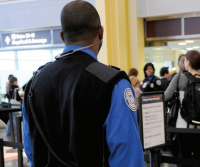US announces plans to inspect books at airport security
'Even someone reading a bestseller like Fifty Shades of Grey or a mild self-help book with a title such as What Should I Do With My Life? might be shy about exposing his or her reading habits'

Your support helps us to tell the story
From reproductive rights to climate change to Big Tech, The Independent is on the ground when the story is developing. Whether it's investigating the financials of Elon Musk's pro-Trump PAC or producing our latest documentary, 'The A Word', which shines a light on the American women fighting for reproductive rights, we know how important it is to parse out the facts from the messaging.
At such a critical moment in US history, we need reporters on the ground. Your donation allows us to keep sending journalists to speak to both sides of the story.
The Independent is trusted by Americans across the entire political spectrum. And unlike many other quality news outlets, we choose not to lock Americans out of our reporting and analysis with paywalls. We believe quality journalism should be available to everyone, paid for by those who can afford it.
Your support makes all the difference.Airline passengers in America may be required to separate out books, magazines and papers from cabin baggage - but civil liberties campaigners have insisted that airport security staff should not be able to scrutinise and assess a passenger’s choice of reading matter.
New airport security procedures being tested by the Transportation Security Administration (TSA) require travellers to remove paper products — as well as foods such as chocolate and cheese - from their carry-on bags. The TSA says it allow screeners to assess the contents of hand baggage more effectively. On the screens used at airports, such items appear dense and may obscure other items.
But Jay Stanley, Senior Policy Analyst for the American Civil Liberties Union (ACLU), has raised concerns about the possible human rights impact.
In a blog titled “New TSA Policy May Lead to Increased Scrutiny of Reading Material”, he says the move would lead inevitably to “greater scrutiny of passengers’ reading materials”, adding: “Someone reading Arab or Muslim literature in today’s environment has all too much cause to worry about discrimination.”
In 2009 a student travelling from Philadelphia to California was interrogated for five hours after airport security staff found some Arabic language flash cards and a book called Rogue Nation: American Unilateralism and the Failure of Good Intentions in his cabin baggage.
Mr Stanley said: “TSA checkpoints are not general law enforcement stops.” Besides the risk that someone might be suspected of being a terrorist, ACLU is also concerned about privacy.
“A person who is reading a book entitled Overcoming Sexual Abuse or Overcoming Sexual Dysfunction is not likely to want to plop that volume down on the conveyor belt for all to see,” said Mr Stanley.
“Even someone reading a bestseller like Fifty Shades of Grey or a mild self-help book with a title such as What Should I Do With My Life? might be shy about exposing his or her reading habits.”
The TSA currently employs several thousand “Behavior Detection Officers”, looking for passengers demonstrating “excessive fear or stress” and subjecting them to additional screening.
Join our commenting forum
Join thought-provoking conversations, follow other Independent readers and see their replies
Comments